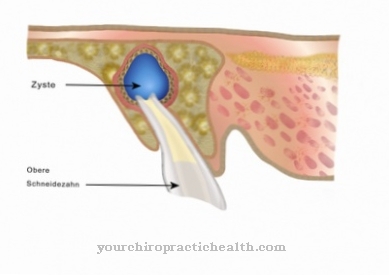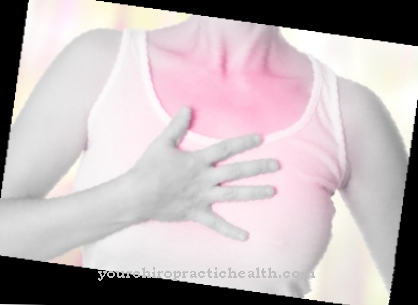The nocturnal interruption of sleep by a violent need to urinate is the rule for many older people in Germany. At least one in ten people over 60 and more than 80 percent of those over 80 suffer from it Nocturia or. nocturnal urination.
What is nocturia?
.jpg)
Nocturia is understood to be the regular and sometimes multiple interruption of night sleep due to the urgent need to urinate.
A seldom urination at night, which can be triggered by an excessive consumption of fluids immediately before going to bed, does not fall under the term nocturia and is therefore not defined as such.
causes
Nocturia can occur for many different reasons. Benign prostatic hyperplasia (BPH), i.e. enlargement of the prostate gland, is a frequent trigger, especially in older men.
As a result of the pressure exerted on the urinary tract, it can narrow below the urinary bladder and thus severely restrict the unobstructed flow of urine. In women, however, a weak pelvic floor, triggered for example by a rupture of the bladder (urethrocystocele) or a prolapse of the uterus (uterine prolapse), can be a reason.
Furthermore, tumors in the urinary bladder or bladder stones can cause the disease. If urinating is painful, there may also be a lower urinary tract infection. Very often a reduction in the capacity of the urinary bladder or an improper functioning of the muscles is also the trigger for nocturia.
Numerous other diseases also lead to increased urine production and thus also to nocturia, such as diabetes, edema, chronic kidney failure, Parkinson's or Alzheimer's. In addition, the use of certain medications or increased alcohol or caffeine consumption can lead to nocturia.
You can find your medication here
➔ Medicines for bladder and urinary tract healthDiseases with this symptom
- Bladder stones
- Pelvic floor weakness
- Irritable bladder
- Sleep apnea
- Bladder cancer
- Urethrocystocele
- Chronic renal failure
- Heart failure
- Benign prostatic hyperplasia
- Uterine prolapse
- Parkinson's
- Diabetes mellitus
Diagnosis & course
Although nocturia in itself does not pose a serious threat to health, it can lead to very serious secondary diseases, as it severely disrupts and severely restricts an elementary component of human well-being - sleep.
A lack of sufficient sleep can lead to comparatively minor restrictions, such as general malaise, sleepiness during the day or a reduction in mental performance, which can, however, significantly reduce the quality of life. In addition, nocturia is also demonstrably responsible for more serious diseases and ailments.
Around 1.8 times as many elderly people with nocturia suffer a fracture of the femoral neck than those who do not suffer from it. Some symptoms of depression, as well as negative effects on the immune and cardiovascular systems, can also be traced back to nocturia.
As diverse and difficult as the complications may be, nocturia is very clear and easy to diagnose: A prolonged night awakening caused by an urge to urinate is very likely to be nocturia.
Complications
Urinating at night interrupts sleep. The regeneration time that the organism needs is interrupted. During the day there is fatigue, which takes a chronic course if the condition lasts for several weeks. Mood swings occur due to tiredness.
The attention and the level of performance are reduced. Job problems threaten or everyday life can no longer be organized as usual. Nocturnal urination can impair the partner's night sleep. This also suffers from the effects of fatigue. Conflicts and quarrels can be the result. Treatment often ignores the fact that in old age urination at night is a natural process.
Sufferers are seldom informed about it and experience a state of distress, although they do not have to. Sleep changes in quality and quantity in the course of life. Medication is often given when it is appropriate to aim for cognitive change.
The medication suppresses urination. They have side effects that can lead to a changed emotional experience. Pressure in the abdomen can arise. Nocturnal urination is linked to fear of bedwetting. An anxiety disorder can develop as a possible complication.
When should you see a doctor?
Nocturnal urination is normal if the person has drunk a lot the night before. The kidneys also work at night, but only in economy mode. A doctor's visit is not necessary. The urge to urinate at night, however, reduces the quality of sleep.
If someone in old age has to go to the toilet several times a night without ingesting significant amounts of fluids before going to bed, a doctor's visit is advisable. Nocturia occurs when urinating at night for no apparent reason. The lack of sleep after getting up several times can make the person very tired. He may suffer from lack of concentration, depression or feelings of exhaustion. If you experience psychological distress due to the nocturnal urination, a doctor's visit is definitely necessary.
Nocturnal urination can cause falls and dizziness in the elderly. Since heart failure with water retention in the body can be the cause of the nocturnal urge to urinate, going to the toilet at night for no reason often requires treatment in older people. Diabetes mellitus can also lead to an increased need to urinate. Therefore, regular visits to the doctor for diagnosis and monitoring of diabetes are advisable. The kidneys, in particular, need to be monitored when urine production increases.
If diuretics, calcium channel blockers, certain antibiotics, or antidepressants cause frequent nocturnal urination, your doctor may be able to change your medication. Since many diseases lead to increased urine production, clarifications are useful.
Doctors & therapists in your area
Treatment & Therapy
Of course, for the successful treatment of nocturia, an in-depth investigation of the cause by the urologist is first and foremost necessary, as the triggering factors must be precisely identified before they can be removed and treated.
If there is a bladder stone or a tumor, it must be removed. An infection of the lower urinary tract can be fought, for example, by taking antibiotics. Nowadays, enlargement of the prostate can be corrected with a small operation.
If the ingestion of medication or an increased consumption of alcohol or caffeine is the identified culprit, the intake must either be reduced, discontinued or, in the case of medication, a substitute preparation found in order to successfully combat the nocturia.
Outlook & forecast
Long-term, untreated nocturia can have a lasting impact on the quality of life of those affected. This includes increased tiredness during the day as well as concentration problems and headaches. Professional difficulties are not infrequently the result.
In the elderly, the effects can be even more severe. Interrupted sleep not only reduces performance, it can also lead to falls and broken bones. In general, the daily routine can no longer be organized in the usual way.
When treated with medication, the chances are good that at least nocturnal urination will be suppressed. However, it should also be taken into account that nocturia can be caused by other diseases. These include, above all, diabetes, high blood pressure and heart failure, all of which are in need of treatment. Therapy for these underlying diseases usually reduces or eliminates urination at night. If treatment is not taken, nocturia can significantly reduce the health and life expectancy of those affected.
Another measure against an overactive bladder is bladder training. It is important to suppress the urge to urinate for a while in order to get the bladder used to more filling. The times between going to the toilet are thus constantly increased. An improvement in the symptoms of nocturia can be achieved after just a few months.
You can find your medication here
➔ Medicines for bladder and urinary tract healthprevention
There is no preventive measure against many of the causes of nocturia, such as tumors or serious illnesses. On the other hand, against some, such as infections. So you should always pay attention to warm clothing and a healthy diet in order to prevent an infection and thus also a possible nocturia.
After a certain age, nocturia is more the rule than the exception. You can protect yourself from some triggers, but unfortunately not most of them. Nevertheless, there is a suitable and often promising treatment method for many of the causes.
You can do that yourself
It seems paradoxical: when urinating at night, it is extremely important to drink enough fluids. However, make sure to add the drinks early. On the other hand, the body begins to metabolize and excrete the fluid at night. Young people are just as likely to wake up at night when they have a drink late at night. Those who suffer from nocturnal urination should limit their caffeine consumption. Caffeine has a driving effect and promotes nocturnal urination.
Another step against urinating at night is to exercise your bladder. The exercise is simple: As soon as you feel the urge to urinate, you shouldn't go to the toilet immediately. It makes sense to wait a few minutes first. In this way, the bladder gets used to larger volumes again and the urge to urinate begins later. Anyone who takes tablets that contribute to weight loss should better avoid them. They have a diuretic effect to excrete the fluids quickly so that no metabolism takes place. If you still want to continue taking these medications, you should only do so in the morning.
If all of the tips are unsuccessful, a doctor should clarify the nocturnal urination. Nocturnal urge to urinate indicates numerous illnesses.













.jpg)

.jpg)
.jpg)











.jpg)